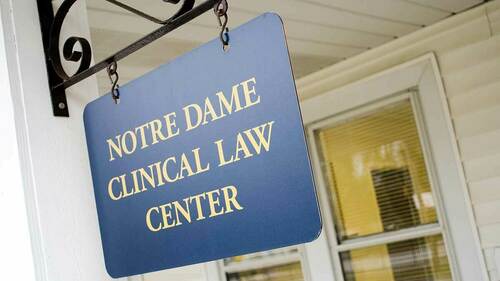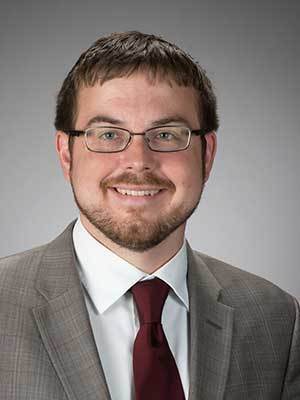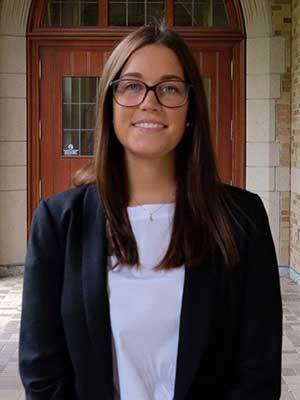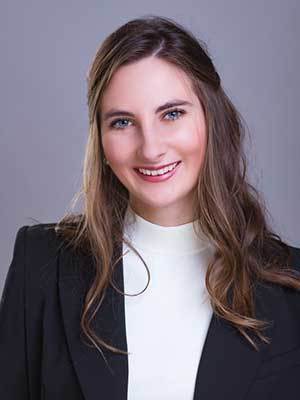
When Patrick Thomas founded the Notre Dame Law School Tax Clinic in 2016, he decided to make it “paperless.” Just four years later, that decision appears prophetic.
The coronavirus pandemic and “stay-at-home” orders affecting Notre Dame and much of the nation have crippled other tax programs, but as a result of his foresight, Thomas, who relies heavily on the work of student attorneys, has only had to make minor adjustments to continue serving clients.

A federally funded low income taxpayer clinic, the Notre Dame Tax Clinic, located inside the Notre Dame Clinical Law Center at 725 Howard St. in South Bend, represents clients in federal tax disputes with the IRS and educates individuals about their rights and responsibilities as taxpayers. Services are free of charge.
Each semester, Thomas supervises eight to 12 students who receive course credit for taking the lead in client representation before the IRS and in litigation. Each is assigned 3 to 6 cases, depending on the complexity of the case. This semester Thomas has 11 students working an average of four cases.
Because all tax clinic files are stored in a cloud-based practice management system and the team utilizes cloud-based tax preparation software, only in-person exchanges have required adjustment, and the intake process has not stopped or even slowed.
While students typically assist with welcoming clients and conducting initial interviews, intake is now being done either by phone or online by Thomas and part-time paralegal Mary Jo Anderson. Thomas says the transition “has not been that bad.”
“As attorneys and certified legal interns in the state of Indiana, we continue to have obligations to our clients under the Indiana Rules of Professional Conduct that must be balanced against the threat of the coronavirus,” he explained. “Since Notre Dame President Rev. John I. Jenkins, C.S.C., delivered his message to the University two weeks ago, we've certainly made a significant shift to nearly entirely remote operations in order to satisfy those obligations while keeping faculty, staff and students as safe and healthy as possible.”

As they adjust to new circumstances, the students are seeing firsthand how the worst of times can bring out the best in people.
“While the country remains at a standstill, our clients’ fears regarding their tax controversies do not simply go away,” says Bailey Hans, a second-year law student from Barnstable, Mass. “I have seen my peers put aside their own worries and personal adversities to go above and beyond to calm their clients and continue to work diligently on their matters. While being far away from our clinic’s resources has been an adjustment for all of us, the support that we have given each other has eased the transition tremendously. I feel privileged to work alongside such compassionate and dedicated people.”
“With much of the aid from Congress being administered through the IRS, this crisis has highlighted the importance of our work at the tax clinic as mediators between low-income individuals and the IRS,” said Jacqueline Heafey, a second-year law student from Miami, Fl. “It has been amazing to see how dedicated my fellow classmates and tax practitioners from all over the nation are to providing the resources low-income individuals need to understand how to claim available aid.”

Fortunately, the student attorneys all have easy access to technology and retrieve client files through the practice management system and other online tools. As with many others working remotely, Zoom is being used for meetings and seminars.
“I'm so glad we don't have to deal with providing access to paper files,” Thomas says. “Clinic staff retrieve the mail on a daily basis and distribute it electronically to the students. We also just purchased an e-fax solution to allow students to fax materials to the IRS remotely.”
Alongside the typical flurry of clinic activity, Thomas is actively involved in tax policy and administration reforms in Indiana and nationally. He applauds the extended federal tax payment deadline from April 15 to July 15, but says there are other deadlines and payment requirements that also need to be adjusted. He recommended to congressional staffers and to the IRS extending the filing deadline for 2019, the deadline on claiming refunds for tax year 2016 and payments on installment agreements or offers in compromise. The IRS has since made some of those adjustments, but has yet to extend the 2016 refund deadline. Thomas advises those who have not filed their 2016 tax return to do so as soon as possible.
“We've also advocated to the IRS, along with many other representatives of low-income taxpayers throughout the country, for collection action to be ceased during the crisis,” Thomas said. “Given IRS workplace shutdowns nationwide, our students were running into issues contacting the IRS to prevent adverse action, so the IRS's announcement March 25 of various efforts to end collections was welcome news.”
Thomas also said that timely policy decisions, along with the dedication of students and staff, have allowed the clinic to successfully balance client obligations with the need to keep everyone safe and healthy.
“Hopefully the IRS and Congress will continue to provide relief from deadlines and other obligations for the duration of this national emergency,” Thomas said, “And, frankly, I've been incredibly impressed by the dedication with which the students have been approaching their clients in this difficult and frustrating time.”
Contact: Patrick Thomas, 574-631-9149, pthomas3@nd.edu; Notre Dame Tax Clinic, 574-631-3272